Out of the three Ramazan drama serials this year, Hum Tum has caught our eye with its fresh take on manhood, relatable characters and a humorous plot.
Starring Ahad Raza Mir, Ramsha Khan and Junaid Khan, Sarah Khan as the two lead pairs, Hum Tum is a modern rendition of the usual hate to love story. The drama takes a typical route seen in Ramazan specials where the plot revolves around two families. The Sultan house has Farhan Aly Agha as an unemployed, habitual bettor who is the man of the house whereas Qutub Mehal is headed by Adnan Jaffer playing Prof. Qutubuddin, a stern chemistry teacher.
Sultan basks in the glory of having two sons Sarmad and Adam (played Junaid and Ahad) who are the pillars of his house, while Prof. Qutub broods and dwells at the fact that he has three daughters; Maha, Neha and Sasha (played by Sarah, Ramsha and Anoosheh Rania Khan respectively).
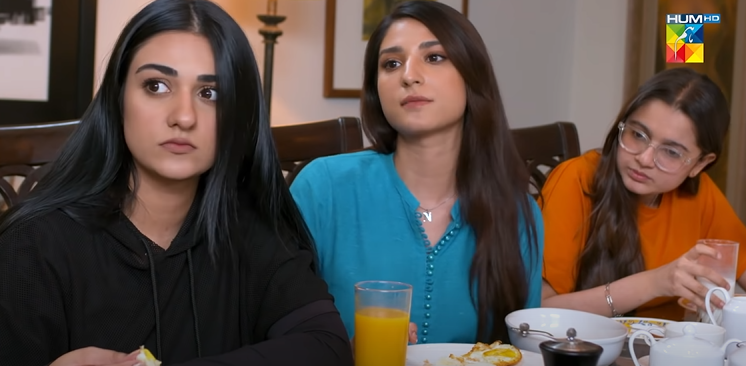
Maha, Neha and Sasha
Adam and Neha are chemistry students who have polar opposite personalities, yet they are constantly in competition. Despite arguing all the time, the two share many similarities. Neha is a trouble-maker at home, the rebellious spirit who doesn’t shy away from voicing her opinion. Similarly, Adam is a mischief-maker who is constantly trying to be in Prof. Qutub’s good graces, but he secretly supports Neha when she isn’t around. There is a spark even in their banter and it appears that the two will develop a unique chemistry of their own.
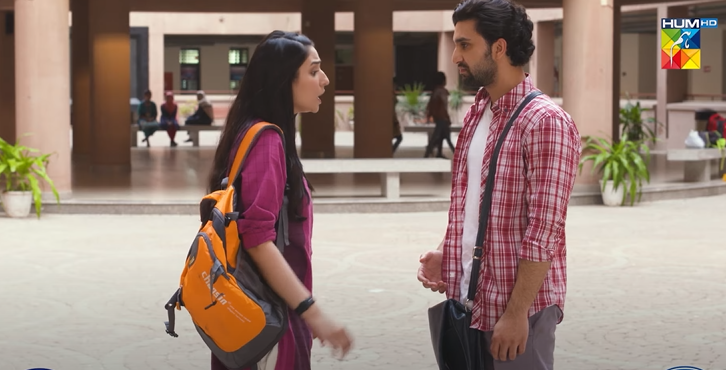
Ramsha as Neha, Ahad as Adam
Read: Haute List: 3 Ramazan plays to watch out for
Another Gen Z couple in the drama is of chef and a sweetheart Sarmad and studious and diet conscious Maha. The attraction is one-sided as Sarmad likes Maha but she repeatedly calls him Sarmad bhai. The paradoxical couple of a food lover and calorie conscious girl is bound to be fall for each other but will have their fair share of hurdles.
Directed by Danish Nawaz and written by queen of Ramazan special, Saima Akram Chaudhry, Hum Tum is a month-long journey that is enjoyable so far. Only three episodes have aired but the drama has developed a loyal fanbase and viewers are praising it for its relatability and uniqueness.
Hum Tum has reintroduced a fresh sensibility in our dramas. It has too many positive plot points that break the mold of done-to-death storylines in our regular TV serials. There is no saas bahu saga, nand jethani clashes, two set of grand-moms or cousin marriages at the very least.
Interestingly, it breaks age-old gender stereotypes and orthodox concepts that have been emphasized and underlined in our dramas like “words of wisdom”, polluting the minds of younger generations.
Let’s have a look at what Hum Tum has done differently:
Role reversals in moderation
The dramas shows three independent and ambitious girls, all position holders and toppers. Neha drives a Vespa, though under close scrutiny of her father. Sasha is a computer genius who aces at hacking accounts. Interestingly, the boys in Hum Tum are expert in house chores. Adam is great at keeping his home neat, tidy and organized. Sarmad is not just a chef by profession, but he loves cooking and feeding his family and neighbours. Despite these role reversals, Adam is a good student. If only the writer had shown one of the girls more competent or adequately skilled for housework, this would have set a a shining example.

No chauvinistic streaks
While Sultan is one of the few who keeps bugging Qutub that he has the burden of three daughters, his sons are not chauvinistic. Adam and Sarmad happily do house chores and help their mother without any superiority complex. Sarmad cooks, handles their restaurant, iron clothes for his sister without any tantrums. Adam takes the tidiness of the house very seriously. He also helps the family of his arch-enemy, Neha, because he has a good heart. Adam also speaks up against street harassment and supports Neha.
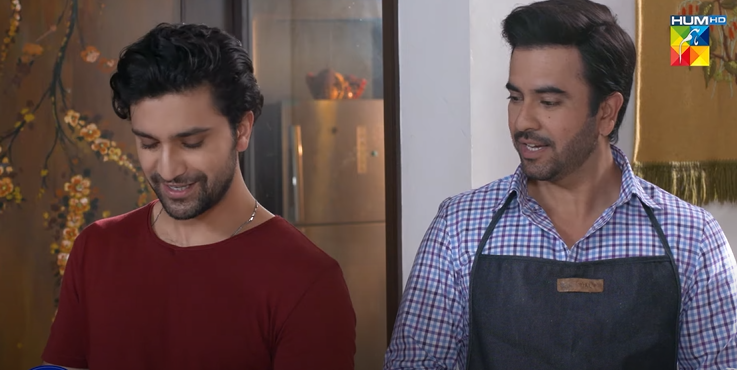 Sibling rivalries and love in equal measure
Sibling rivalries and love in equal measure
Sibling rivalries are so redundant in dramas that they can make one wish to be an only child. At a time when every sister is ready to steal her sister’s husband, Hum Tum shows beautiful bonds. Adam and Sarmad adore their younger sister. Adam brushes her hair, does her math’s homework in bad handwriting, supports her to learn martial arts; it is enviable!
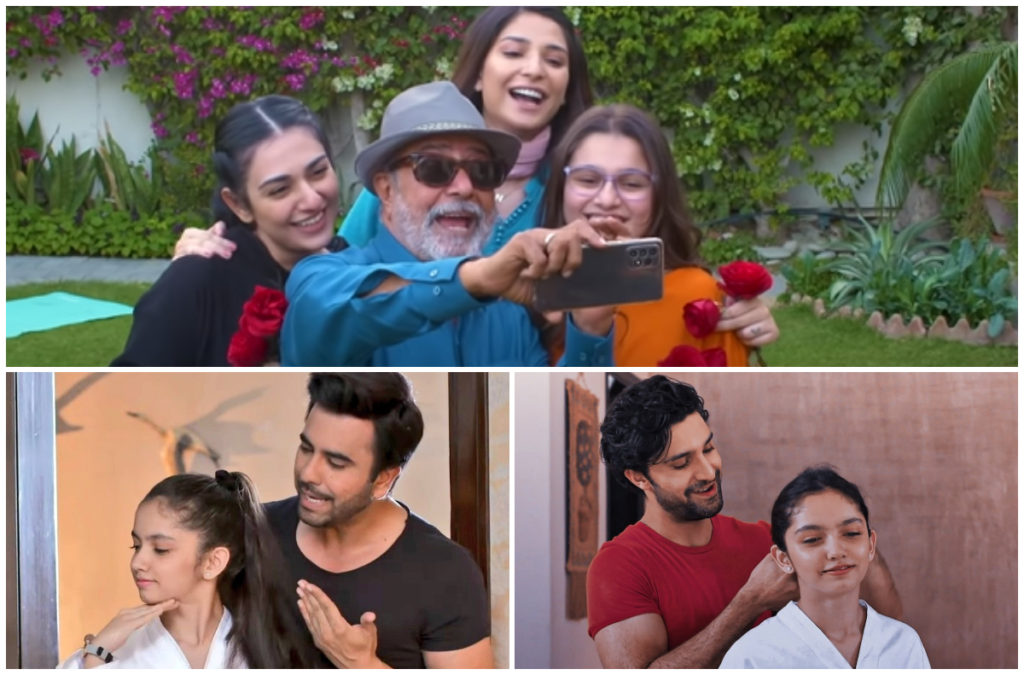
In the other household, the three sisters squabble all the time but they always take a stand for their mother. They support each other when in need and help each other in plotting schemes.
Lessons for those who desire to have a son
The drama sheds light on the obsession of having a son to feel empowered. The South Asian society is still hung up on procreating a male progeny and feel burdened by daughters. Similar is the case of Prof. Qutub, who by his mannerisms, constantly shows that he is dissatisfied because he doesn’t have a son. Despite having three well-raised, diligent and respectful daughters, he takes them as a burden due to societal pressures.
The emphasis on change
Qutub’s father (played by Mohammad Ahmed) says a beautiful line in the drama when he tells his son not to repeat the same mistakes that he made. He was a strict father who didn’t let his son explore much and hence Qutub turned out to be a stern dad as well who wants everything according to his rules. The granddad acknowledges that he took a wrong approach while raising his son and doesn’t want him to repeat it with his daughters.
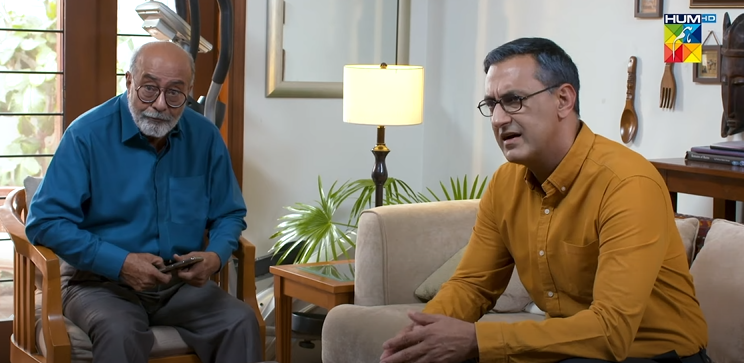
Funny quirks
The best aspect is that Hum Tum doesn’t use most of its characters as comic elements in the story; it is mostly the situations that are hilarious. There are certain quirks that Saima has knitted intelligently in the storyline like the names Halima and Sultan are a reference to Ertugrul and the fact that Halima is forgetful adds a punch in scenes. Her daughter Millie is raised as a boy amongst two elder brothers and she mixes her gender pronouns frequently, but her brothers are chill about it. Adam and Sarmad’s father is an idler, and they have heard complaints about him all their lives. Yet there is an element of comedy and respect in their relationship.
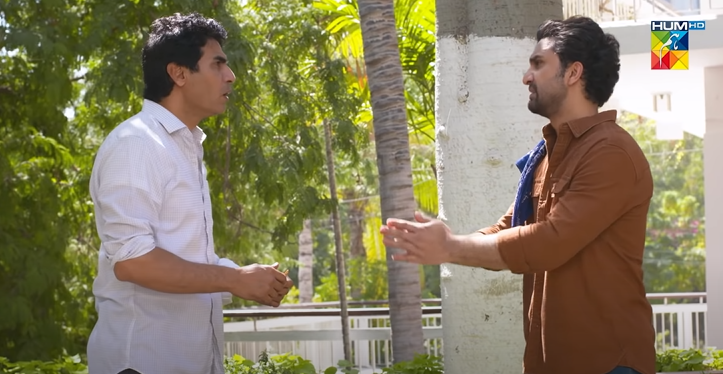
Adam with his father
Smart portrayal of sensitive subjects
The writing is quite impressive when it comes to portraying sensitive subjects like gender determination and divorce. Neha aptly puts that her mother is not to be blamed for giving birth to three daughters. It is highly unlikely that a primetime TV drama will ever quote the XY chromosome logic to rest an argument.
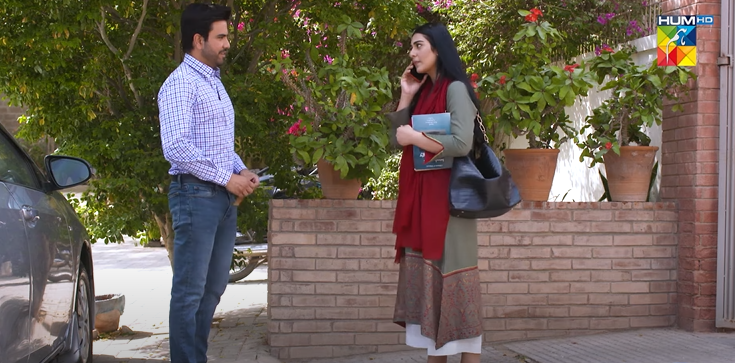
Junaid as Sarmad, Sarah as Maha
Similarly, Hum Tum also treats the label of divorce very sensibly. Maha was married to a greedy man and the marriage was annulled; there are several mentions of the event in the episodes. However, no one in her family or neighbours cracks jokes or makes fun of this incident. Sarmad also likes her irrespective of her marital status. Interestingly, both Adam and his nani mentions that Maha is highly qualified for him and deserves better.
What could be improved?
Hum Tum has its own set of predictable themes yet they don’t irk us a lot: a superfluous character like Adam’s nani (played by Uzma Baig) doesn’t add much. She is a unsuccessful matchmaker and all marriages fixed by her end up in a divorce, including Maha’s first nikah. The mother of three studious girls, Ulfat played by Arjumand Raheem, is unskilled and disorganized thus all her daughters are shown the same. Unfortunately, this reemphasizes the notion that ambitious girls cannot be good homemakers.
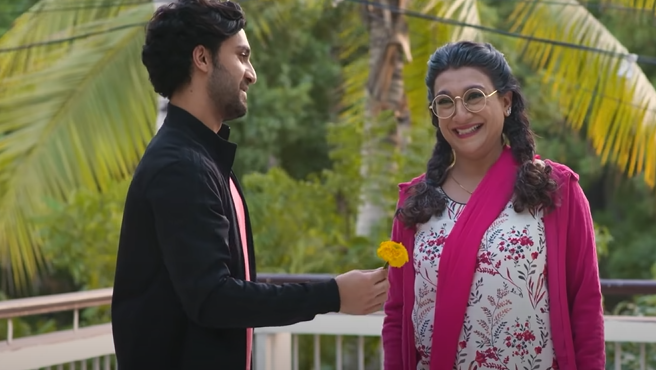
Uzma Baig as Nani
Alas, this story will also eventually lead to two marriages — the most common theme in Ramazan specials and our dramas throughout the year — but hopefully the journey to this foreseen future is not formulaic.
Hum Tum airs every night at 9pm on Hum TV.





